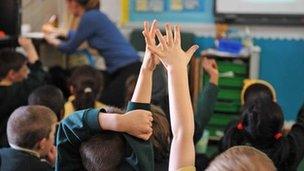Estyn report: Basic skills development failings in schools
- Published

The Welsh government is planning a new National Literacy Programme
Many schools in Wales are failing to plan well enough on how to develop basic skills among 11-14 year-olds, schools' inspectorate Estyn has warned.
It found that many schools do develop literacy and numeracy skills in English, Welsh, maths and IT lessons, but not in other subjects.
And 40% of pupils cannot read as well as they should as they start secondary school and some never catch up.
The Welsh government says it is working to address the issues.
The Skills Framework was introduced, on a non statutory basis, in 2008.
It aims to help children develop across all subjects their basic skills, such as thinking, questioning and communicating, which can be used later in life in work and further education.
Estyn's chief inspector Ann Keane acknowledges that it has raised awareness of the need to develop transferable skills she describes as "vital for the education and future careers of young people".
But she admits it has not been influential enough at Key Stage 3.
"We found that although nearly all schools have someone with overall responsibility for the development and implementation of skills, only a few schools successfully plan the progressive development of pupils' skills across the curriculum," she said.
'Spot on'
Instead, Estyn found that schools are placing the highest priority on schemes of work matching the national curriculum subjects they teach.
Anna Brychan, director of the National Association of Headteachers Cymru said Estyn's assessment was "spot on".
"I don't think we should be particularly surprised that we've got here," she said. "There are two problems really.
"Schools, perfectly reasonably, plan and deliver the curriculum that policy-makers say they must deliver.
"In that context the non-statutory Skills Framework has not been very highly valued or closely measured. There is also a lack of precision in the framework itself.
"Schools can't make everything a priority so increasing the profile the framework, for example, would inevitably start a conversation about reducing the pressure elsewhere.
"A clear steer on what is most valued would be very helpful at this point."
Phil McTague, head teacher of Eirias High School in Conwy, said his school had completely restructured its curriculum into eight "projects" to provide the relevant skills.
"For example, we have a project called 'celebrations' and that integrates English, religious studies, art, music and our delivery of Chinese Mandarin," he said.
"The aim there is for the children to use their skills in a multi-disciplined way as you would in the world of work, and ultimately that's what they're going to inherit."
In January this year, Estyn's annual report found that 20% percent of pupils arrived at secondary school with a reading age below nine years and six months - generally considered the level of functional literacy.
'Action plan'
This week, Leighton Andrews is due to publish his National Literacy Programme.
Its aim is to achieve a step change in literacy standards in the next five years.
Central to the programme is the National Literacy and Numeracy Framework, which he says will ensure that the teaching of those skills is embedded in all subjects across the curriculum.
The Welsh government welcomed the report.
"Through the minister's 20-point action plan to improve standards and performance in education in Wales and our new literacy and numeracy framework, we are working hard to address these issues," said a spokesperson.
Estyn's report outlines a number of recommendations for secondary schools, local authorities and the Welsh government, including ensuring that skills development is assessed and tracked effectively.
- Published31 January 2012
- Published8 May 2012